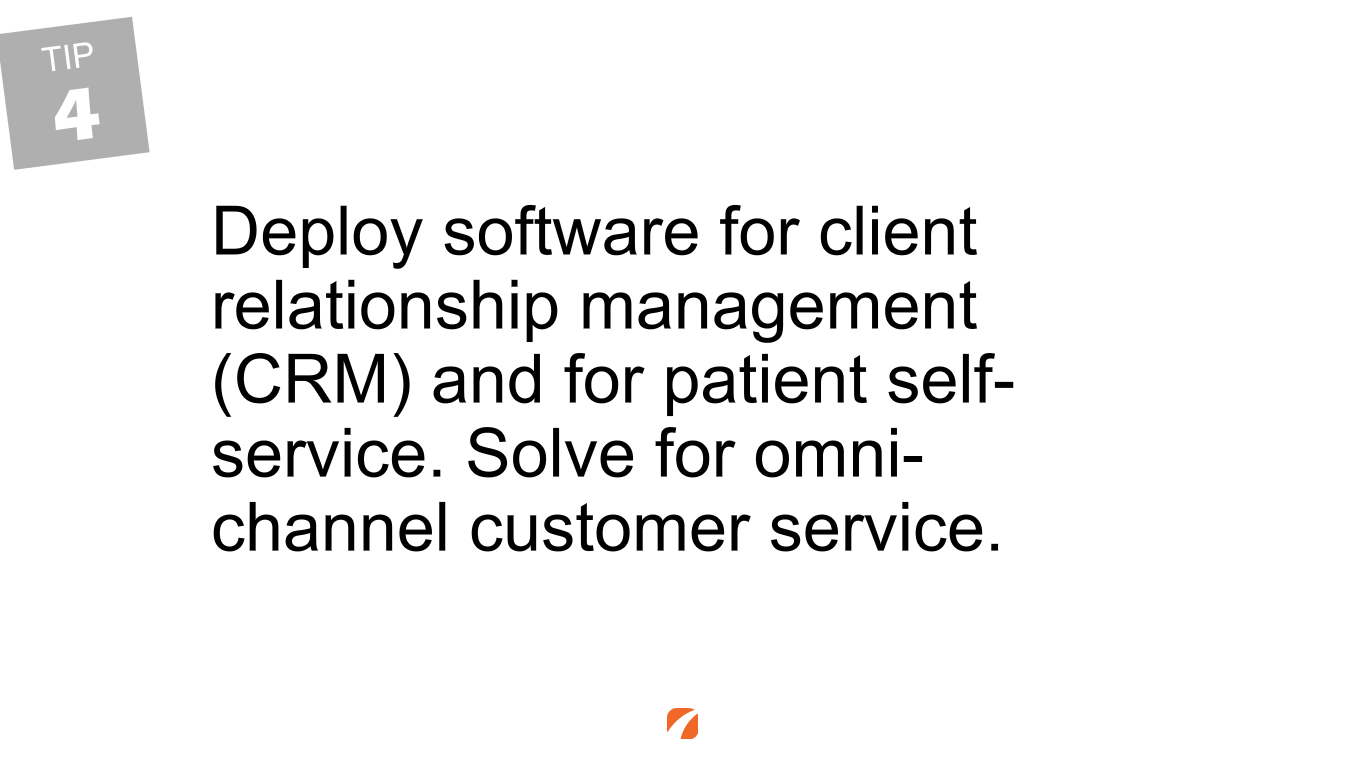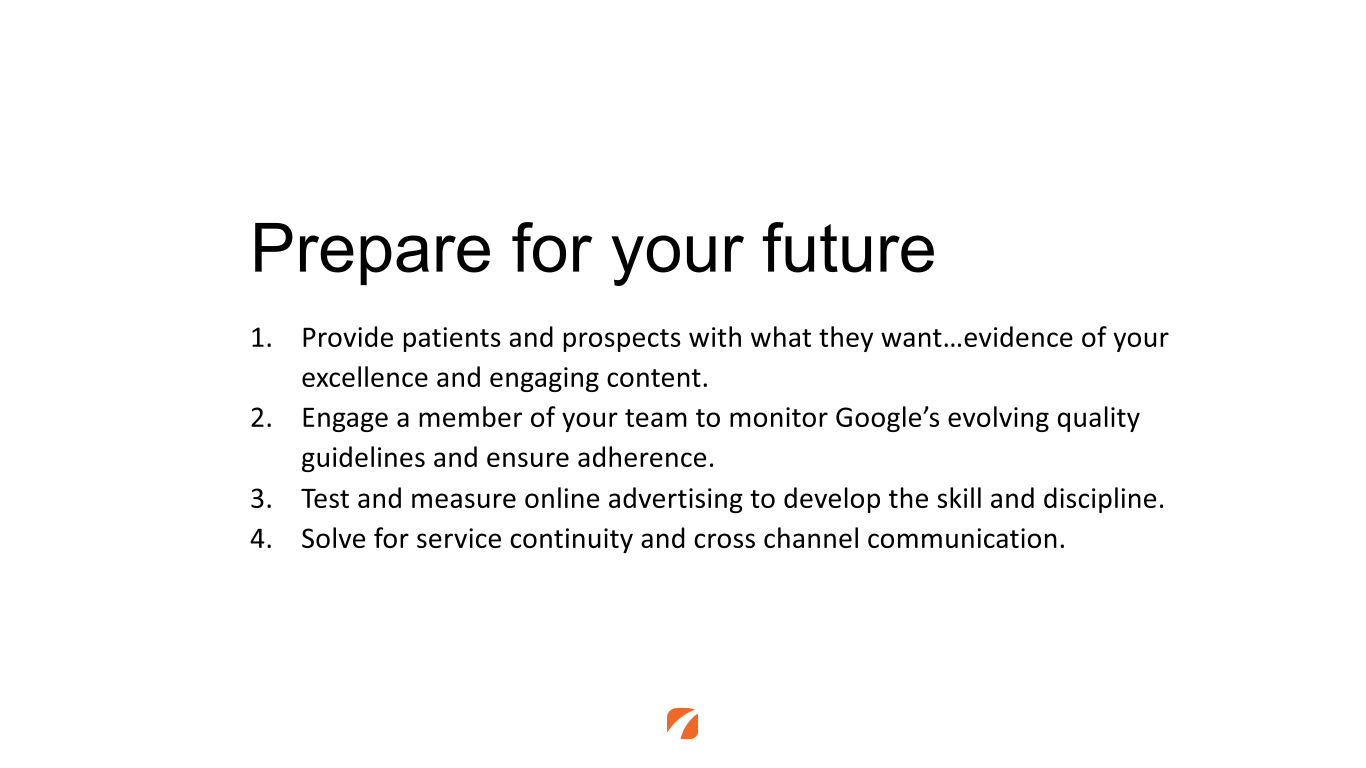Follow along with CEO Ryan Miller as he discusses four predictions for the future of elective medical marketing online, each followed with helpful tips and advice to ensure that you are prepared with how to best support your practice when the time comes.
Video Transcription
Welcome back, Ryan Miller again with Etna Interactive and we’re going to be doing one of my least favorite things together today which is, trying to predict the future. Now, in order to make this somewhat workable and reliable, we’re going to take a look back over the last couple years and identify, and really talk about four ways that you can help future proof your practice. Like I said, forecasting the future, not my favorite thing, but there’s been a lot of great indicators over the last couple of years about some specific trends that are emerging, and likely to continue to develop.
The first of those is that we’re going to see more and more power shift directly into the hands of the consumer. When we look back over the reports that have come out, and the patents that have been filed by Google as it relates to search and the Google search algorithms, we see more and more ways that consumer behaviors, the things they click on, how much time and how they choose to interact with things like your content and your pages are directly influencing which sites rise to the top of search.

In fact, they’ve actually gone out and suggested through a series of quality rater guidelines, which we’ll talk about again in a second, that things like consumer ratings at the Better Business Bureau may actually have an impact on which sites find their way to the top of search.

When we think about social media, the metrics on your screen are very informing. An individual consumer today with a small number of followers, just 338 in the example I’m giving you here, due to the changes in the algorithms on sites like Facebook and Instagram, can reach the same number of people with their posts that a brand can reach with a million followers. When we kind of step back and we look at that, there’s the understanding that there’s been this kind of democratization of content around the web. What does that mean for you and how do you future proof your practice?

Our first piece of advice here is really make sure that you understand what patients want and need from you, as a medical provider who’s hoping to market on the web, and that you are developing compelling pages, a really stellar reputation, and investing more time in video to educate that consumer.

The other thing that we’re seeing emerging is a lot of themes around trust, and specifically that if you break trust with Google, well, it can bury you today. Now we’ve talked about this in a recent video, and we’ll link out to that in case you want to go into greater depth, but there’s this idea that as medical professionals, the content that you provide, well the stakes are pretty high. Now Google classifies this content as ‘Your Money or Your Life’ content ‘YMYL’. I’ll blank out some of the policy guidelines that they’ve put out here and I’ll focus in on the things that matter the most. Basically, they’ve formally stated to the world, that for health and safety information there’s simply a higher bar of trust that’s required if you hope to rank in search.

Many experts agree, we look at quotes like these that suggest that, ‘look, businesses or individuals with a great reputation, well their content should probably do better and be trusted more than those with a poor reputation’.

In fact, we’ve seen a number of policies recently where Google has cracked down on businesses that are publishing reviews that are self-serving, and specifically implemented policies that prohibit certain kinds of medical content, the promotion specifically, of medical therapies that are speculative or experimental, in their Google Ads platform.

They’re actually taking a financial hit to raise the bar of trust on the content that they forward around the web.

What this means for you is that you need to take care to guard your reputation online, to keep a close eye on how Google’s policies are evolving, and be ready to react quickly. Now, if you’re an Etna client, keeping that eye on those policies, that’s what we’re doing for you. Ideally, if you’re not, this is something that you can trust your agency partnership or your own internal team to keep an eye on.

The third of the four trends that we want to talk about today is unfortunately not a very bright outlook, but it’s that the costs of acquiring new patients online, we can expect to continue to see those climb as we get into the new year. If we roll all the way back to the beginning of 2018 Facebook made their move to radically reduce the visibility of what you as a business post online.

We’ve seen over the last year that Google has introduced a bunch of new ad formats, like now you’ll notice that there’s ads in the map result set when you do a search on Google for the services that you offer in the markets that you serve, so they’re creating new ways to charge you money.

When we look, if you focus across that graph there and look at where does health and medicine rank, it’s one of the taller bars, over $3 per click on average for the promotion of any medical service on Google’s ad platform. As we’ve watched that over the last year, year and a half, we’ve been seeing those average costs per click steadily climb.

So what does it mean for you as a medical professional? You have to develop the discipline to avoid what we in the industry refer to as ‘ego bidding’, bidding to position, rather than bidding for financial performance. And, you need to develop the expertise to measure those investments since they’re getting more expensive, that means there’s more risk of loss and the greater need to make sure you’re properly optimizing those ads to ensure that you still get the performance that you’ve enjoyed in the past.

Now the last idea here is really not about online marketing, but the intersection between patient expectations and this completely connected world that we live in today. If we take a step back and we look at some of the data that’s out there, it’s pretty self-explanatory. A lot of people when surveyed said they would rather go out and reference a knowledge base, or self-service, than to try to weather navigating a voicemail system or directly contacting a business to solve their problem.

Basically, when we talk to consumers directly and ask them, ‘well what is it that you want to do?’, they don’t want to call you for support anymore. They’d like to be able to go online to book or change appointments, to pay a bill or understand their treatment history.

As we look at customer expectations across all of the touchpoints, there’s some really strong evidence that ineffective or incomplete customer service is a major driver for patients to leave one business and move to another.

The challenge for you as a business owner, I actually think this is one of the more exciting ones, is about stepping back and looking at how do we deploy software, customer relationship management software, to create a continuity of experience with anyone that they touch in our practice. And, how do we ultimately solve the need to support customers on all of the channels that they’d like to reach our practice today. It’s likely going to mean that you embrace some new technology, train the team that you have differently, and take the time to carefully understand where are your patients, how do they communicate, and how best can you service them into the future.

If you have thoughts or suggestions here, let’s run back through those ideas. We really want to hear from them, what else is coming for the future. We think the things you need to be looking at today is making sure you understand what patients need so you can make sure you’re delivering the right content, because their votes, well it’s becoming more democratic out there, are having a greater influence on what’s going to be right and visible into the future. We want to make sure that you’re keeping a close eye on Google’s policies, and your own reputation because they’re changing quickly and you don’t want to be left behind. We want to take the time to develop the expertise so you can carefully measure and monitor your performance in pay-per-click advertising, because as costs increase on popular online platforms, you’re going to need the discipline to make sure that you don’t over pay for your next patient. Finally, start thinking about providing service of the future and being able to service patients on any channel with a clear understanding across all the members of your team of your history, and your relationship with that patient.

I’m sure you have other ideas about what’s coming, or questions about what we’ve talked about today, be sure to leave a comment down below and we’ll get right back to you.


Leave a Comment